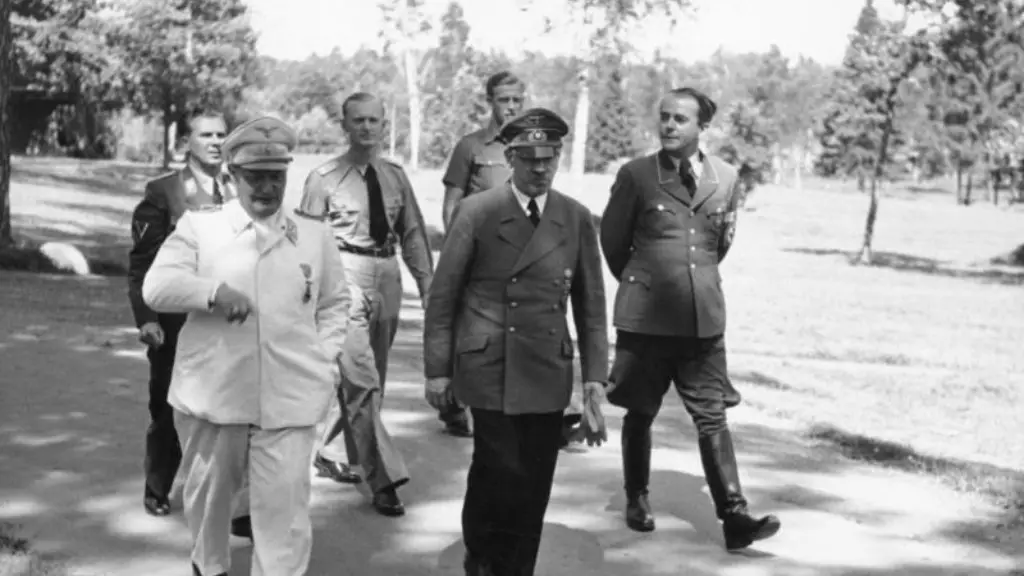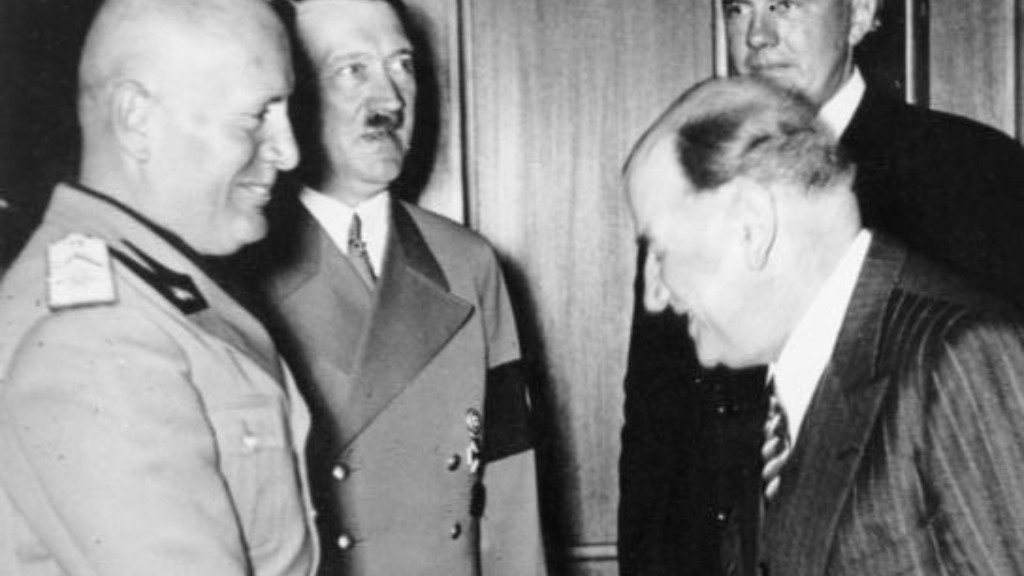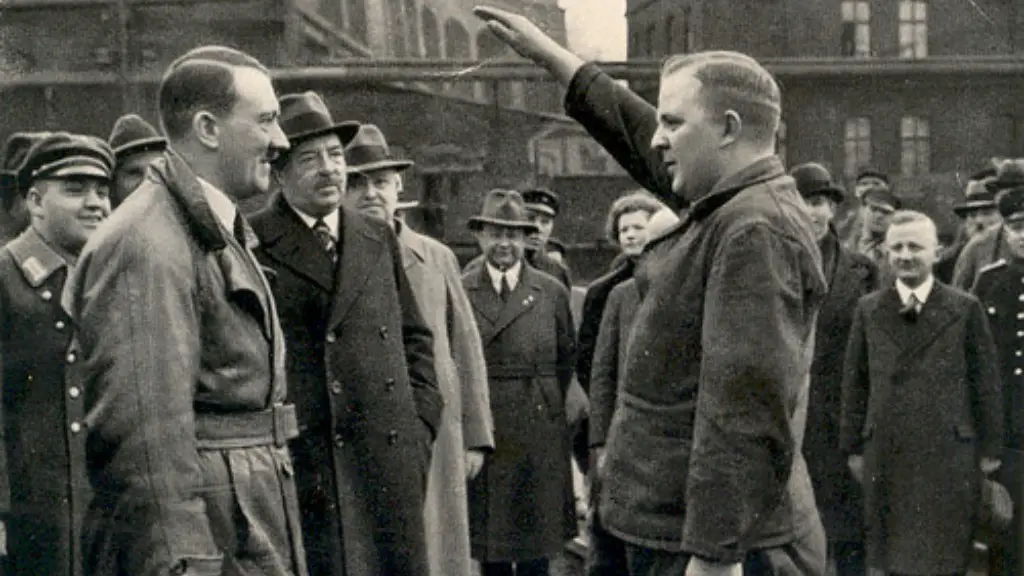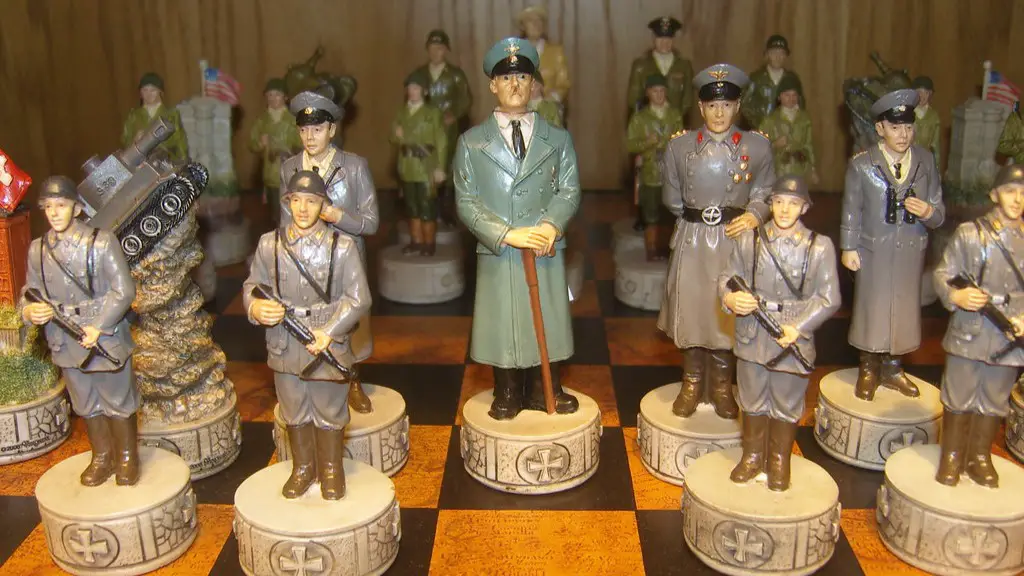Adolf Hitler was born in Austria in 1889. In 1913, he moved to Germany and became a German citizen. After serving in the German army during World War I, Hitler joined the National Socialist German Workers’ Party (Nazi Party) in 1919. He became the party’s leader in 1921.
In 1933, Hitler was appointed Chancellor of Germany. The Nazi Party now had full control of the country. Hitler began to put his plans for a “New Order” into action. The Nazi regime ruled by terror. Hitler had enemies killed or imprisoned. Jews, Romani people, homosexuals, and others were killed or sent to concentration and extermination camps.
World War II began in 1939 when Hitler invaded Poland. During the war, Hitler’s forces committed mass murder and atrocities in countries they occupied. In 1945, the Allied powers defeated Hitler’s Germany. Hitler committed suicide before he could be captured and put on trial.
Adolf Hitler rose to power in Germany through a combination of factors: his own personal charisma, the appeal of his ideas, the weaknesses of his opponents, and his strategic skills in exploiting opportunities.
The economic and political turmoil of the 1920s provided Hitler with his opportunity. Germany had been defeated in World War I, and its economy was in ruins. Many Germans were angry and frustrated, and were looking for someone to blame. Hitler’s radical nationalist and anti-Semitic ideas appealed to many Germans, and his eloquent speeches won over the people.
Meanwhile, Hitler’s opponents were divided and weak. The Social Democrats and the Communists were unable to work together, and the more moderate parties were ineffective. Hitler was also able to take advantage of the fact that the Weimar Constitution allowed the Chancellor to rule by decree in times of emergency.
As Chancellor, Hitler quickly began to consolidate his power. He appointed Nazis to key government positions, and used his position to pass laws that gave him even more power. He also began to silence his opponents, through intimidation, violence, and propaganda.
By the early 1930s, Hitler was the absolute ruler of Germany, and he had complete control over the government, the economy, and the media. He
Which was the major reason for Adolf Hitler’s rise to power in Germany?
The economic crisis in Germany in the early 1920s was a major factor in the rise of Adolf Hitler and his Nazi Party. The widespread economic misery, fear, and perception of worse times to come, as well as anger and impatience with the apparent failure of the government to manage the crisis, offered fertile ground for the rise of Hitler and his party.
Adolf Hitler came to power with the goal of establishing a new racial order in Europe dominated by the German “master race”. This goal drove Nazi foreign policy, which aimed to: throw off the restrictions imposed by the Treaty of Versailles; incorporate territories with ethnic German populations into the Reich; acquire .
What was a major reason for Hitler’s rise to power quizlet
The Treaty of Versailles was a seedy political deal between Hindenburg and Papen that promised to overturn it. The German people were angry about the Treaty of Versailles and supported Hitler because of this. Hindenburg and Papen foolishly thought they could control Hitler, but they were sadly mistaken. Hitler had other plans for Germany, and the world would soon find out.
Germany has become an important country today primarily due to its strong economy, healthcare system, education, and membership in the EU and NATO. Although it does not have a large military or land area, these other factors have more than made up for that and have helped Germany become a leader in most European countries.
What was Hitler’s new order?
The objective of the Nazi party was to establish a German empire that would be unrivaled in all of Europe. This was to be accomplished through the expansion of German territory and the subjugation of the other European nations. The Nazi party believed that this would create a stable and prosperous Germany that would be able to maintain its position of power in the continent.
The worldwide economic depression of the 1930s was a major factor in the rise of the Nazi Party in Germany. The Nazis appealed to many Germans who were angry about the country’s economic problems and the failure of the democratic government to solve them. The Nazis also benefited from the support of the country’s powerful labor unions and the communists.
How did Germany increase its power in the late 1800s quizlet?
Germany increased its power in the late 1800s by industrializing and taking advantage of its natural resources. Several new companies emerged and quickly gained notoriety, boosting the economy.
The German Empire was a political unification of various German states that occurred on January 18, 1871. It was the result of three successful wars by the North German state of Prussia. Within a seven-year period, Denmark, the Habsburg monarchy, and France were vanquished in short, decisive conflicts. The German Empire resulted in a strengthened economy and military, which allowed for further expansion across Europe and the world.
When did Germany become a great power
In just a few short years, Germany went from being a young, insignificant nation to the strongest power on the European continent. This was due to a number of factors, including their victory in the Franco-Prussian War, which resulted in the annexation of Alsace-Lorraine from France. Germany also had a strong industrial base, which they used to their advantage during the war. Following their victory, Germany began to flex their muscles on the international stage, and their reputation as a powerful nation was cemented.
The years 1941/1942 were the high point for the German army. At its peak, the army controlled an area from France to deep into Russia, and from Norway to western Egypt.
What was Hitler’s last effort?
The Battle of the Bulge was Germany’s last ditch effort to win World War II. The offensive was launched in December 1944 in an attempt to push the Allies back and force them to accept a truce. The battle was fierce and resulted in heavy casualties on both sides. In the end, the Allies were victorious and the Battle of the Bulge became one of the turning points of the war.
The attack on Pearl Harbor was a cowardly act and the American people stood behind their government’s decision to declare war on Japan. In response, Hitler declared war on America on 11 December 1941, for Germany was an ally of Japan. This meant that Hitler had gained another strong opponent.
What was Hitler’s last major offensive
The Battle of the Bulge began on December 16, 1944, and lasted until January 25, 1945. It was one of the largest and bloodiest battles ever fought by the United States. More than 19,000 Americans were killed and over 60,000 were wounded.
The battle was a turning point in the war in Europe. After the Battle of the Bulge, the Allies began their march to victory.
Even though it had emerged from World War II and the postwar Soviet demolitions economically ravaged, its surviving industrial infrastructure, inherited skills, and high level of scientific and technical education enabled it to develop the economy and to advance the standard of living to a level markedly higher than.
How did Germany get so powerful before ww1?
With its large and rapidly growing population, Germany was able to meet the labour needs of industrialisation. By 1900, German steel production exceeded Britain’s and was second only to the United States. This growth was largely due to the large population, which provided a large pool of potential workers. Additionally, the growing population meant that there was a growing market for German products, which helped to fuel industrial growth.
Germany’s power increased dramatically after it unified in 1871. The country became an industrial giant, outpacing even Britain in some areas. This helped Germany to become a leading European power, and it also allowed the country to build up a strong military.
Final Words
Adolf Hitler rose to power in Germany through a combination of his own personal charisma, the appeal of his own nationalist ideology, the economic turmoil of the early 1930s, and the weakness of the existing Weimar Republic political system. Although Hitler initially came to power through legal means, his administration soon became a dictatorship that relied on terror and force to maintain control.
Adolf Hitler’s rise to power was due to a number of factors. These included the economic and political conditions in Germany following the First World War, his own personal skill as a politician and speaker, and the support of key figures within the German government. Hitler was also able to exploit the popular feelings of nationalism and anti-Semitism that existed in Germany at the time.





